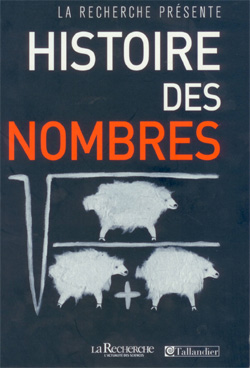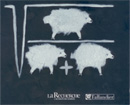 Was Pythagoras right to claim that “numbers are the essence of things”? Is it appropriate, like Galileo, to consider that “the book of nature is written in mathematical language”? Many of the answers to these questions can be found in “The History of Numbers,” a work composed of articles published in the magazine “La Recherche” and updated by the authors for the great benefit of Editions Tallandier. We can thank the same publisher for intentionally, if I may say so, varying the pleasures: mathematical geniuses or enthusiasts, as well as literary lovers of metaphysics or esotericism, will find in this publication something to satisfy their insatiable curiosity. Let’s move on then — may the scientists forgive me — from these p-adic numbers, from the proof of Fermat’s theorem, a more accessible chapter nonetheless, or from the double correction of “turbocodes,” to touch upon a few more… philosophical facts.
Was Pythagoras right to claim that “numbers are the essence of things”? Is it appropriate, like Galileo, to consider that “the book of nature is written in mathematical language”? Many of the answers to these questions can be found in “The History of Numbers,” a work composed of articles published in the magazine “La Recherche” and updated by the authors for the great benefit of Editions Tallandier. We can thank the same publisher for intentionally, if I may say so, varying the pleasures: mathematical geniuses or enthusiasts, as well as literary lovers of metaphysics or esotericism, will find in this publication something to satisfy their insatiable curiosity. Let’s move on then — may the scientists forgive me — from these p-adic numbers, from the proof of Fermat’s theorem, a more accessible chapter nonetheless, or from the double correction of “turbocodes,” to touch upon a few more… philosophical facts.
Readers will appreciate the short yet historically rich development by Catherine Goldstein on “the birth of the number in Mesopotamia,” a beautiful story of reed and clay consecrating the “separation between the quantitative and qualitative written sign.” Following this, we shall share with Hourya Benis Sinaceur Aristotle’s questions on infinity, “that which cannot be traversed,” questions which were subsequently corrected a few centuries later by Spinoza, who distinguished the “true infinity” as an indivisible substance close to divine essence, from the “false infinity,” that of “numbers, objects of imagination.” How can one, moreover, escape the intrigue, always fascinating for a human being eager for rationalization, of prime numbers in a study presented by Henri Cohen?
Unlike men, numbers make history and also know the history they make. We shall remember the questioning of part of Cartesian theory by later discoveries of Newton and Leibniz. The “universal time” of philosophers stated in Bergson’s “Duration and Simultaneity” is also rigorously questioned by the theory of “relativity” described by Einstein. He, in turn, according to Gregory J. Chaitin, refuted the early 20th-century quantum mechanics which reintroduced “a fundamental indeterminacy in the nature of things.” “God does not play dice,” maintained the Nobel Prize-winning physicist. More disputes of numbers.
The last chapters of the book bring us closer to everyday life: after the history of the “meter,” we learn a bit more with Fabienne Lemarchand and Loïc Blondiaux about the origin of census techniques and the culture of opinion polls, a point the abbot — and revolutionary! — Emmanuel Joseph Sieyès viewed with disfavor: no need, he explained in essence, to question the Nation since the “Parliament wills for it.” A nearly prophetic vision. “Do we really know what we are counting?” recently asked an incisive article in Le Figaro. Numbers, especially when they are unfavorable, are not always the best allies of men.
“History of Numbers,” Editions Tallandier, 2007, 298 pages, 23 euros.


